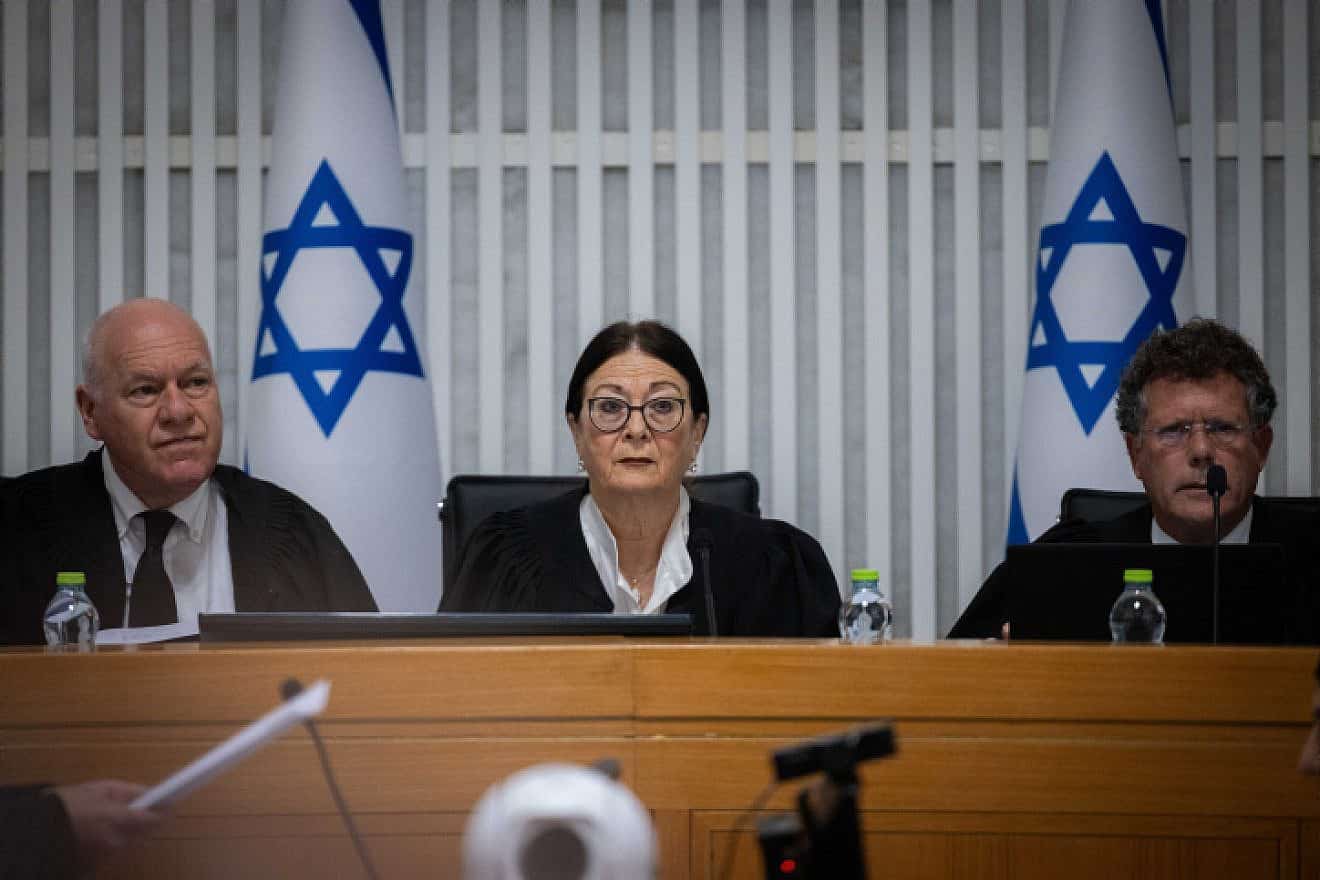 How Israel’s Supreme Court can strengthen democracy
How Israel’s Supreme Court can strengthen democracy
ROBERT SILVERMAN
 Chief Justice of Israel’s Supreme Court Esther Hayut at the hearing of the government’s “reasonableness” law, at the Supreme Court in Jerusalem, Sept. 12, 2023. Photo by Yonatan Sindel/Flash90.
Chief Justice of Israel’s Supreme Court Esther Hayut at the hearing of the government’s “reasonableness” law, at the Supreme Court in Jerusalem, Sept. 12, 2023. Photo by Yonatan Sindel/Flash90.
On Tuesday, Israel’s Supreme Court convened amid an atmosphere of heightened political tension to hear petitions asking it to strike down a recently-passed Knesset law. No ruling is expected imminently, but political compromise proposals by Israeli Prime Minister Benjamin Netanyahu and others indicate a growing concern with leaving the matter in the hands of the court.
Part of the new Israeli government’s judicial reform package (and the only element enacted thus far), this law bars judges from using the “reasonableness standard,” a defined principle in Israeli jurisprudence with established criteria, and one previously used to overrule as “unreasonable” both legislation and certain kinds of executive actions. Both sides have taken to the streets to argue for or against these laws’ effects on Israel’s democracy.
What may seem like dry material for a law review article on justiciability to outsiders is a hot-button political debate in Israel. Yet there is a solution available to the court that allows both sides to win in a way that also strengthens Israel’s democracy.
Israel’s Marbury v. Madison Moment
“It is emphatically the province and duty of the Judicial Department to say what the law is.” — Chief Justice Marshall in Marbury v. Madison, 5 U.S. at 177
Israel is not the first democracy to face a political crisis over a supreme court’s ability to review and strike down legislation. The United States, the world’s oldest democracy, faced just such a crisis in the second generation after its founding, in the case of Marbury v. Madison (1805).
The story behind the Marbury case illuminates a court’s ability to establish its supremacy in interpreting the law, while at the same time limiting itself vis-à-vis the political branches of government. Thus it’s worthwhile to tell the story behind the Marbury case.
On March 4, 1801, Thomas Jefferson was inaugurated as the third president of the United States after a bitterly contentious election. Two days before, outgoing president John Adams, Jefferson’s opponent in the race, had appointed nearly 60 of his supporters to federal positions and, on its last day in office, the outgoing Congress had confirmed the appointments en masse.
Jefferson refused to recognize these last-minute appointments, relying on the technicality that some of the commission documents had not been delivered to the appointees before the turn-over of administration on March 4. One of the appointments was of Maryland financier William Marbury as justice of the peace (a low-level judge) for the District of Columbia.
Marbury then sued Jefferson’s Secretary of State James Madison to force the new administration to honor his appointment (at the time, part of the Secretary of State’s job was to impress the Great Seal of State on official documents and have them delivered to the intended recipients).
 ROBERT SILVERMAN – A former U.S. diplomat and president of the American Foreign Service Association, Robert Silverman is a lecturer at Shalem College, senior fellow at the Jerusalem Institute for Strategy and Security and president of the Inter Jewish Muslim Alliance.
ROBERT SILVERMAN – A former U.S. diplomat and president of the American Foreign Service Association, Robert Silverman is a lecturer at Shalem College, senior fellow at the Jerusalem Institute for Strategy and Security and president of the Inter Jewish Muslim Alliance.
Zawartość publikowanych artykułów i materiałów nie reprezentuje poglądów ani opinii Reunion’68,
ani też webmastera Blogu Reunion’68, chyba ze jest to wyraźnie zaznaczone.
Twoje uwagi, linki, własne artykuły lub wiadomości prześlij na adres:
webmaster@reunion68.com
